The 10 Worst Teams To Play in a BCS Bowl
The 10 Worst Teams To Play in a BCS Bowl

This January, Connecticut will be the first unranked team to play in a BCS Bowl, leading many people to protest their inclusion, saying that they aren’t good enough to deserve a BCS bid.
But are they truly the worst team out there? We won’t know for sure until we see how well they do against Oklahoma (who have certainly been victims of BCS underdogs before), but we can certainly compare this year’s Connecticut team to some questionable teams of the past.
10. 1999 Stanford Cardinal

1999 was a down year for the Pac-10, with almost every team finishing 7-5 or worse. The Stanford Cardinal were the clear champions, going 7-1 in conference and earning a berth in the Rose Bowl.
They didn’t fare so well out of conference, though, getting routed 69-17 by Texas to start the year and losing to 3-7-1 San Jose State to follow up.
Stanford put up a fight against Wisconsin in the Rose Bowl, holding them to a mere 17 points, but ended up losing 17-9.
9. 2009 Cincinnati Bearcats

The 2009 Cincinnati team weren’t a terrible team by any means, but they went undefeated against the likes of Southeast Missouri State, 3-9 Illinois and the stigmatized Big East.
When it looked like No. 2 Texas had lost the Big 12 Championship game to Nebraska, many people started questioning whether the Bearcats really deserved their top three ranking, and possibly a national championship berth, with undefeated TCU and Tebow-led Florida waiting in the wings.
Texas ended up winning their game and going to the national championship, and Cincinnati had a chance of their own to prove that they deserved their ranking above Florida. They failed, losing convincingly to the Gators in the Sugar Bowl, 51-24.
8. 1998 Syracuse Orange

Led by Donovan McNabb, the 1998 Syracuse Orange seemed like the real deal. They opened the season losing by just one point against eventual national champions Tennessee, beat 10-3 Michigan in Ann Arbor, and nearly ran the table in the Big East.
Despite losing three games that season, they finished the year ranked 15th and earned a spot in the Orange Bowl against the eighth-ranked Florida Gators.
The Gators proved too much for the Orange, however. McNabb proved a non-factor, with Florida racking up a 28-3 lead in the first half. The Gators relaxed in the second half, but it didn’t help, and the Orange walked away with a 31-10 loss.
7. 2007 Illinois Fighting Illini
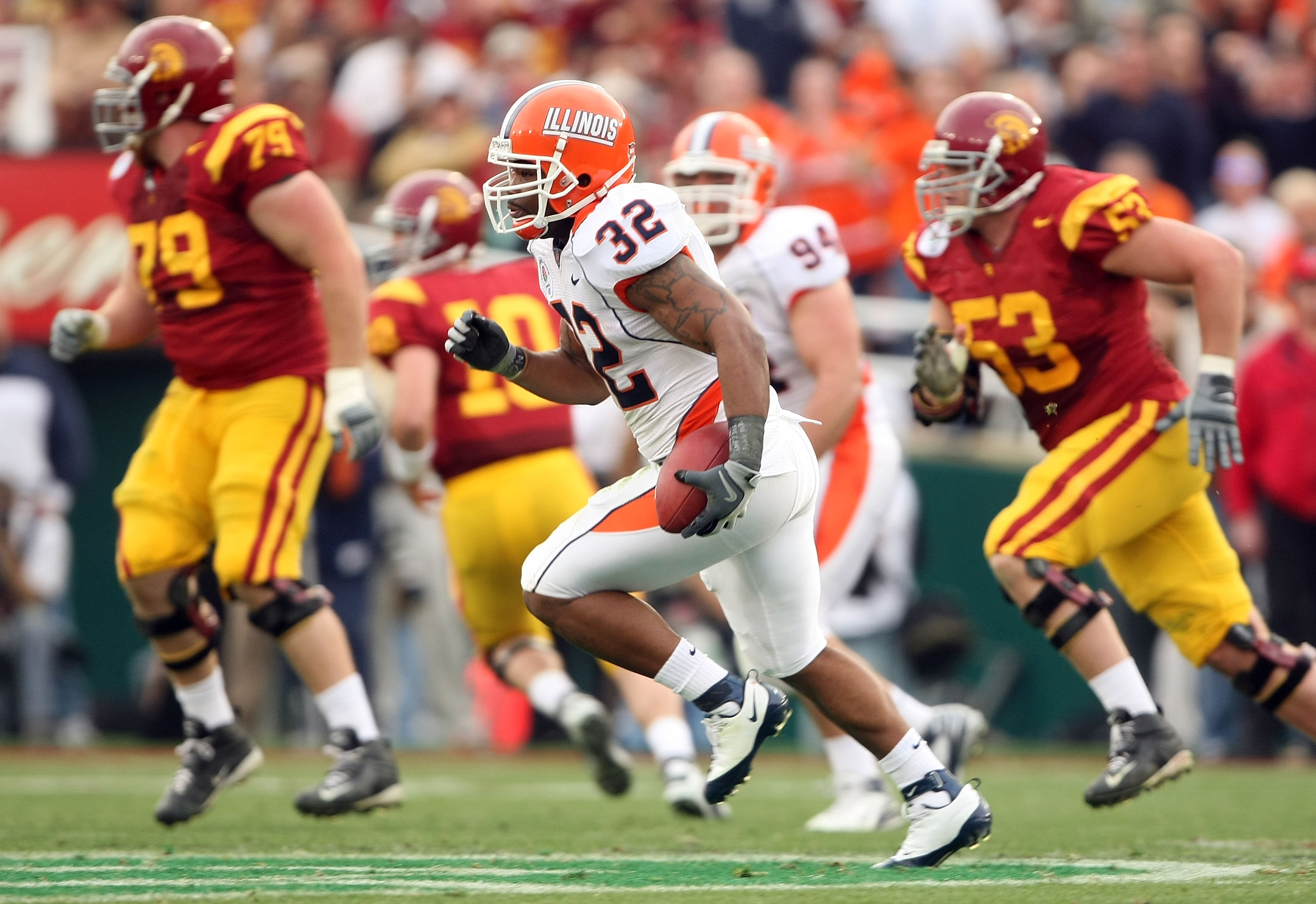
Though the Big Ten had several ranked teams in 2007, they had a poor history of proving themselves in the BCS (Big Ten teams not named Ohio State had gone 1-6 in recent years).
With Ohio State bound for the national championship game, the 2008 Rose Bowl had first pick for a replacement.
There were several enticing options, with Kansas or Missouri available from the Big 12, and Georgia or Florida available from the SEC, but the Rose Bowl wanted a traditional Pac-10, Big Ten match-up, so they chose 9-3 Illinois.
The choice may have pleased their conference sponsors, and it also freed the Big 12 and SEC at-large teams to play in their conference’s traditional bowls, but it didn’t make for enticing football. USC easily dispatched the Fighting Illini, racking up 633 yards of offense en route to a 49-17 rout.
6. 2008 Alabama Crimson Tide
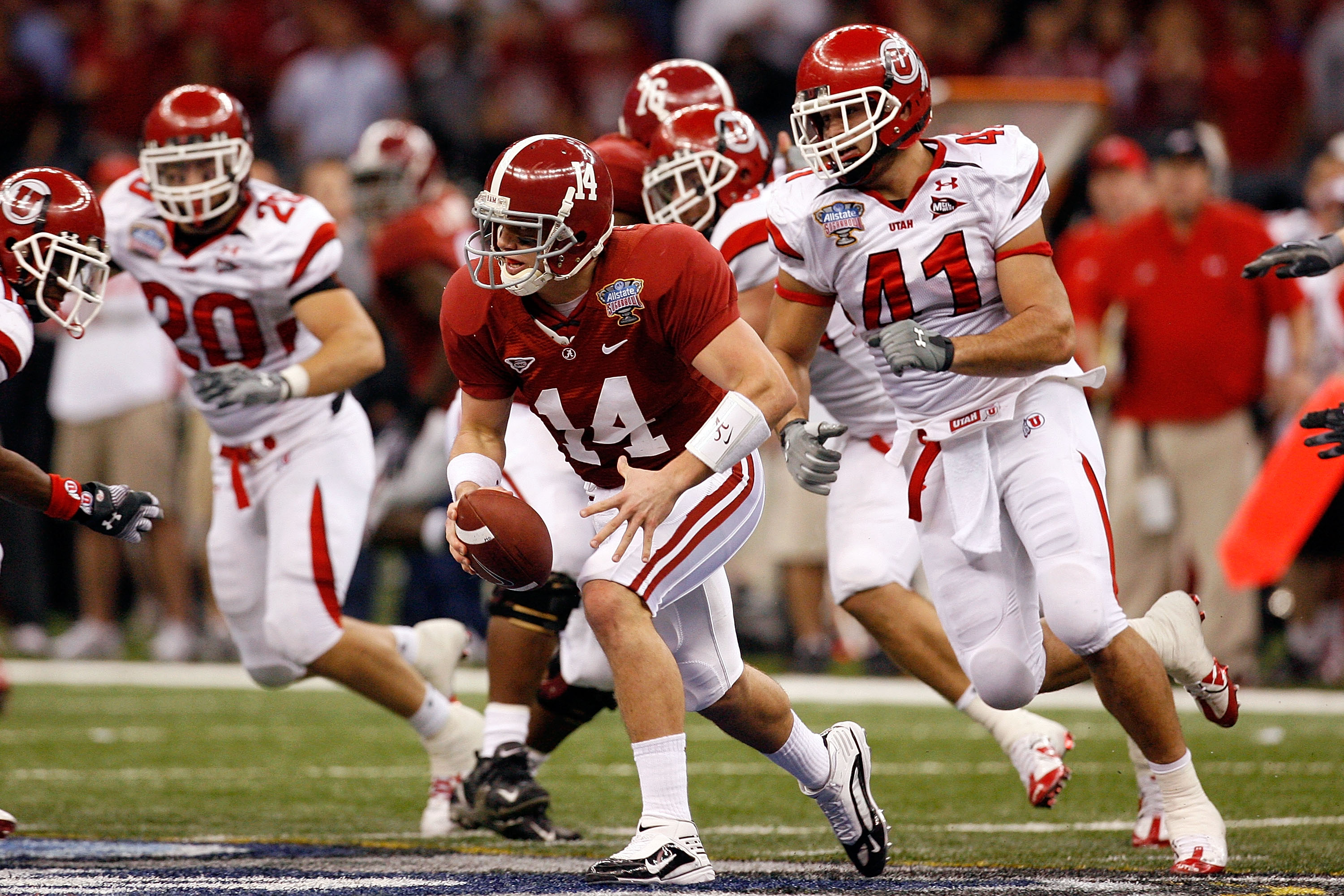
Alabama opened the 2008 season with a win against No. 9-ranked Clemson and ran the table in the mighty SEC, climbing all the way from the bottom of the rankings to No. 1, going 12-0 into the SEC championship game and being the favorite to win the national championship.
They were upset by the eventual national champions Florida (like so many on this list), but still earned a trip to the 2009 Sugar Bowl.
It might seem strange to say, then, that the 2008 Crimson Tide were one of the worst teams to play in a BCS bowl, but the Tide who played in the Sugar Bowl were not the same team that went undefeated in the SEC.
Or perhaps they really were overrated, and with an OOC schedule against Tulane, Western Kentucky, and Arkansas State, they had just never been exposed.
But one thing is for sure—the frustration of having the national championship within their reach for the first time in 18 years was not the right emotion to have when they had to face the original BCS busters, the Utah Utes. The Tide were soundly defeated, 31-17.
5. 2004 Pittsburgh Panthers
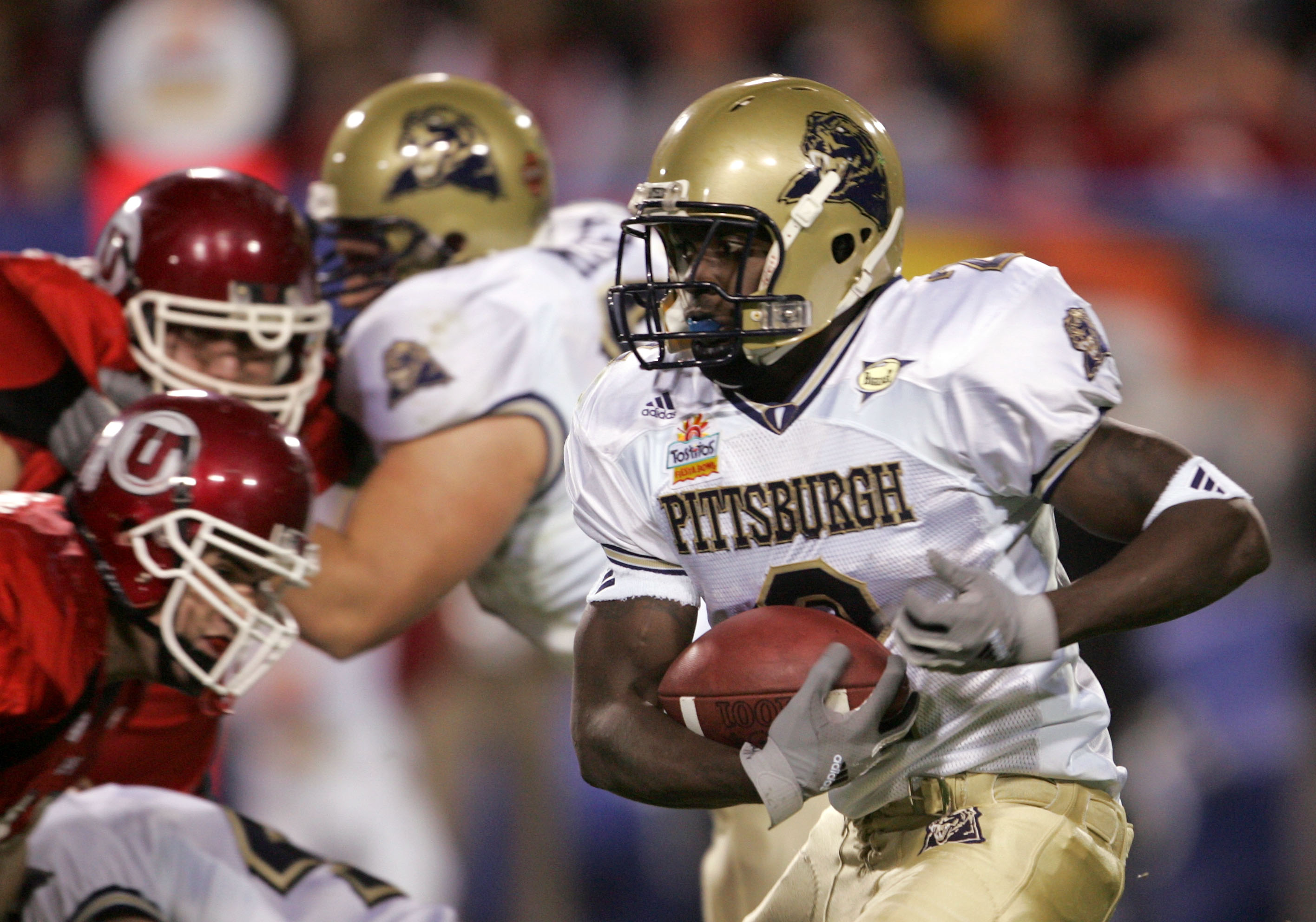
The ACC raided the Big East in 2003, swiping football powers Miami and Virginia Tech, leaving the 2004 Big East title ripe for the picking. The eventual champions were the Pittsburgh Panthers, earning them a trip to the Fiesta Bowl.
Their path to the Fiesta Bowl was not very treacherous, the only real quality win being a victory over Boston College, while losing to mediocre teams like Nebraska, Connecticut and Syracuse.
There was a small ray of hope for Pittsburgh, however. Their Fiesta Bowl opponent was Mountain West champion Utah, and the common belief at the time was that no mid-major team could contend against a BCS team, no matter what conference.
This belief was proven wrong, with Utah obliterating Pittsburgh 35-7.
4. 2004 USC Trojans

It would be ridiculous to say that USC was one of the worst teams on the field in 2004, as they were crowned national championships after destroying No. 2 Oklahoma 55-19 in the Orange Bowl. USC began the year on the top of the polls and ran the wire, never dropping from No. 1.
There is no doubt, however, that this USC team caused lasting damage both to the school and to college football as a whole.
USC was forced to vacate their Orange Bowl victory as well as their Rose Bowl win against UCLA the month before due to sanctions from the Reggie Bush scandal, and the current USC program still suffers massive penalties from these sanctions, despite not having any of the same students and a different coach.
As for the rest of the nation, the season is considered to have no national champion, despite Oklahoma going 12-0 in the regular season, Utah going 12-0 after winning the Fiesta Bowl, and SEC champions Auburn going 13-0 in what has since been considered the strongest conference in the country, none of these teams will ever be recognized as 2004 champs.
3. 2006 Ohio State Buckeyes/Michigan Wolverines
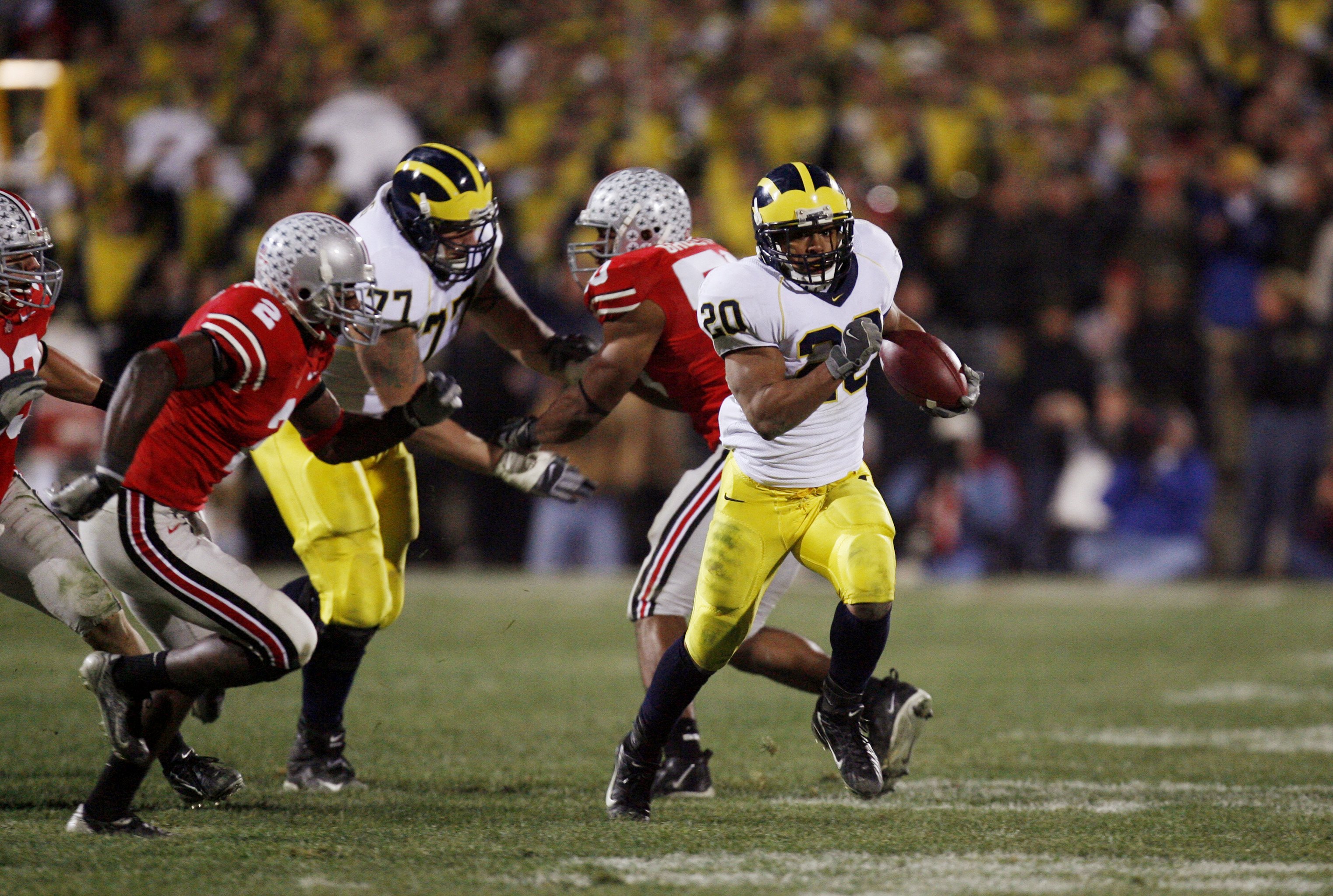
The Big Ten looked like they owned college football in 2006. Ohio State and Michigan ran the table, with Ohio State taking down No. 2 Texas and Michigan taking down No. 3 Notre Dame in the process.
So dominant were these two teams that as they approached their end-of-year rivalry game, the talk of the nation was whether they should be allowed to play a rematch in the National Championship game if the game was close, effectively handing the title to the Big Ten without having to face an opponent outside of the conference.
The game was in fact close, with Ohio State beating Michigan 42-39, and the debate was on whether there would be an all-Big Ten title game. Eventually, 11-1 Florida pushed past Michigan, pitting them against Ohio State while Michigan faced USC in the Rose Bowl.
USC easily took care of Michigan 32-18, while Florida demolished Ohio State 41-14. There was no doubt left that the Big Ten were decidedly not the undisputed best in the country.
Those who had supported the idea that they be allowed to play each other for the title had to come to terms with the fact that they had all but betrayed the spirit of the BCS, giving the Big Ten a national title by opinion alone, an opinion that ended up proving invalid.
2. The Notre Dame Fighting Irish
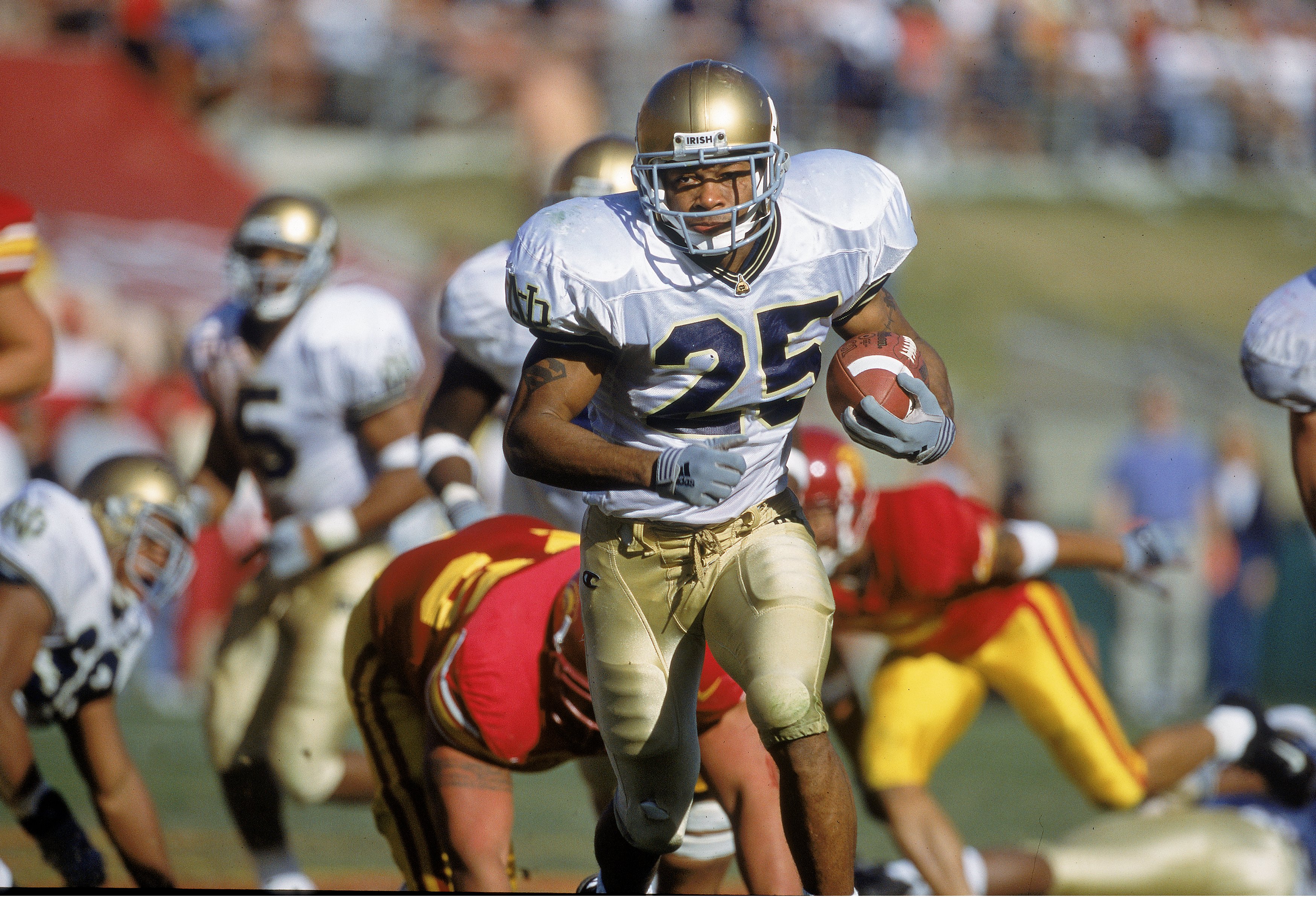
When the BCS was established, Notre Dame’s independent status had to be addressed. No other team in the nation had as great a football legacy as Notre Dame, and it would have been a crime to exclude them from national championship contention simply because they didn’t have a conference affiliation.
Special allowances were made for Notre Dame, and if they were sufficiently ranked, their entry into the BCS was assured.
However, the Notre Dame of the BCS era has not proven to be the Notre Dame of years past. Three years they finished with only two losses and at least a couple wins against ranked teams, and they would finish the year in the top 12 and a BCS bowl bid.
Each BCS bowl they were exposed as frauds, getting routed by Oregon State 41-9 in the 2001 Fiesta Bowl, losing 34-20 to Ohio State in the 2006 Fiesta Bowl and getting routed once again, 41-14 by LSU in the 2007 Sugar Bowl.
1. 2007 Hawaii Warriors
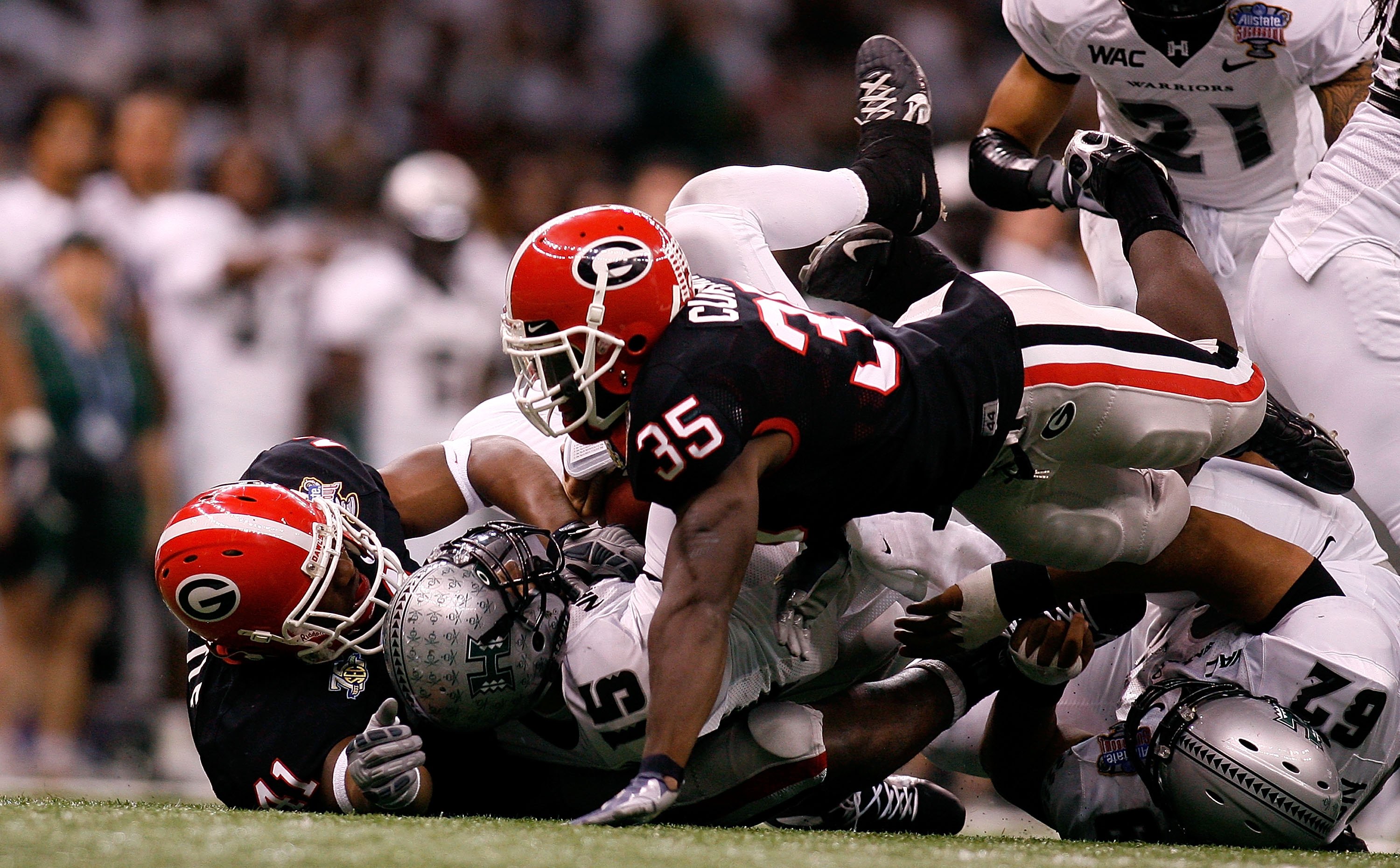
After Utah’s coming-out party in the 2005 Fiesta Bowl and Boise State’s epic battle against Oklahoma in the 2007 Fiesta Bowl, people started to get hungry for more triumphant non-AQ teams to break into the BCS and shake things up.
Right on cue, the Hawaii Warriors started climbing up the rankings and winning fans.
Many had their doubts about the Warriors, who were taken to overtime by 5-7 teams Louisiana Tech and San Jose State and had one of the weakest schedules in the country, but the critics had been embarrassed by dismissing Utah and Boise State in years past, so they decided to keep quiet.
It turns out the detractors were right. Hawaii got manhandled 41-10 in the Sugar Bowl by 10-2 Georgia. Not only was Hawaii decidedly beaten, but only three of their opponents finished with winning records and only one won their bowl game.
The Warriors were, beyond any other team to play in the BCS, wholly unproven.
